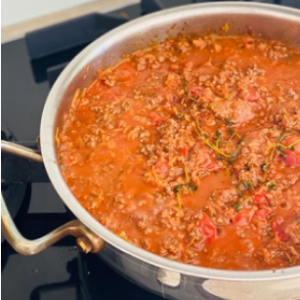Part of my mission, both as a nutritional therapist, and when I set out to create Ondine cookware, has always been to cut through the noise of conflicting and confusing advice which is out there and help more people learn about a holistic approach to their nutrition and health.
Nutrition is complex and so specific to the individual, for example my 3 children are all very different. I have custom pro and prebiotics for each of them, so I’m wary of those who give advice for everyone to follow without this important context.
Getting one to one support and a tailored plan for your nutrition and wellbeing is an incredibly worthwhile investment but I’m aware it’s not possible for everyone.
With this in mind I’ve put together 8 ways to eat better – straightforward tips for improving the way you eat which truly will benefit everyone.
1. Cook from scratch
The reason this is so important to me is because so much food is dressed up to appear healthy when sugar, salt and preservatives have been added and the steps involved in processing have stripped it of nutritional value.
I’m aware that not everyone has time to cook elaborate meals and in the recipes I share on the Ondine journal I try to include a range including some very simple dishes that can be prepared quickly or prepared ahead.
2. Let your children cook with you
This was such a big part of my upbringing, I’m very grateful to my parents for sharing their love of food and instilling in me a lifelong interest in cooking.
Those of you with young children may flinch at the idea of getting them involved in cooking (and the possible resulting mess!) but something as simple as allowing them to stir the bowl or scatter breadcrumbs which you’ve prepared on top involves them in the process of preparing food and begins to form an appreciation for preparing and sharing meals. It can also be more fun than you think! I urge you to give it a try.
3. Grow your own herbs and vegetables
The idea of growing your own vegetables may conjure up visions of living in a rural idyll surrounded by a huge garden but you can grow things like tomatoes and peppers, microgreens and various herbs on a sunny windowsill or a small container on a balcony.
Again, this involvement with the process of seeing where food comes from is wonderful for children and adults alike. Instagram posts from In a Tiny Garden and Sow Much More might provide more inspiration.
4. Eat organic as much as possible
Where you can, choosing organic fruit, vegetables, meat and cereals not only provides gives you better flavour but recent studies have actually shown increased levels of beneficial antioxidants and significantly lower levels of toxic heavy metals. You can read more about this study in one of my previous journal posts here.
5. Eat seasonally
We’re biologically designed to eat seasonally, certain foods were scarce at certain times of the year and we would eat like this in hunter gatherer times.
Ondine’s chef ambassador Adam Byatt is particularly passionate about this subject! When we spoke to him recently he encouraged all of us to “take joy in waiting…you regain a sense of occasion with food when you must wait for it. Ingredients in the peak of their season absolutely taste better and make you feel more connected to the season you are in.”
I’m planning another journal post on this subject soon.
6. Eat smaller portions and eat slowly
This is not new advice but can make such a difference. Eating slowly and mindfully not only gives you more connection with the food you’re eating but helps you to feel full so you don’t overeat.
7. Try not to eat in front of the TV
Similarly to the previous point, being distracted by the television leads to mindless eating, where you can consume a whole meal without even really tasting it.
I’d really encourage eating as a family or with your partner where you can and growing that relationship between sharing food and feeling connected by discussing the meal, your day and whatever else comes up.
If you have younger children you can describe the food or encourage them to if they’re old enough – in my opinion no sensory classes can compare with the shapes, colours, flavours and textures in even a simple meal.
8. Add more vegetables
Much nutritional advice seems to centre around restricting and removing things from your diet but psychologically this sets you on a negative path from the start. I’d encourage you to think simply where you can add more vegetables. Grating a carrot into a bolognese sauce or adding avocado to some brownies which the whole family can enjoy for example.
There are some more tips from the British Heart Foundation here.
I hope you find these encouraging and easy to incorporate into your routine. For more tips on nutrition and wellbeing you can follow me on instagram.
If you’d like to find out more about tailored nutritional advice please do feel free to contact me directly here.
Marie
Founder of Ondine








